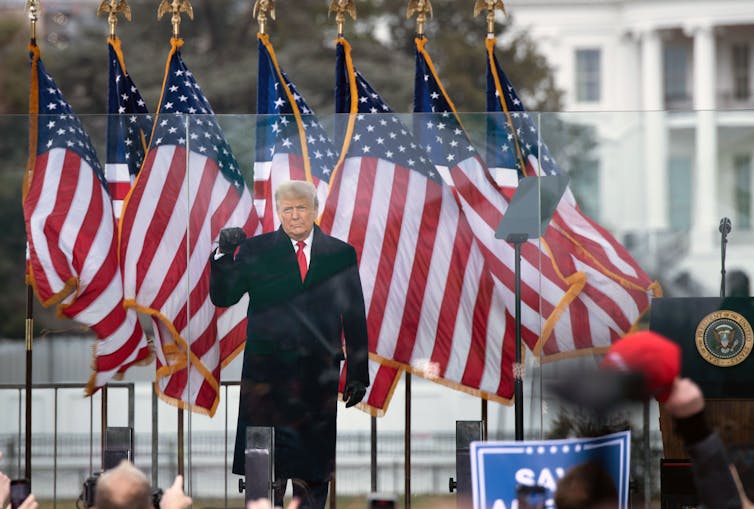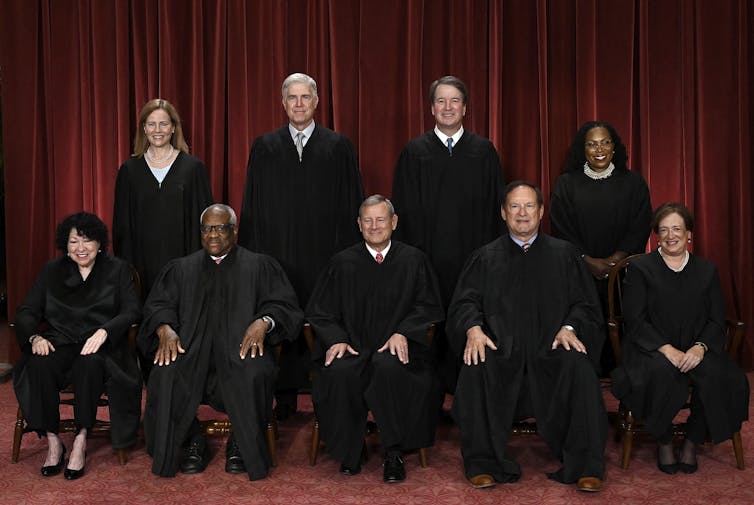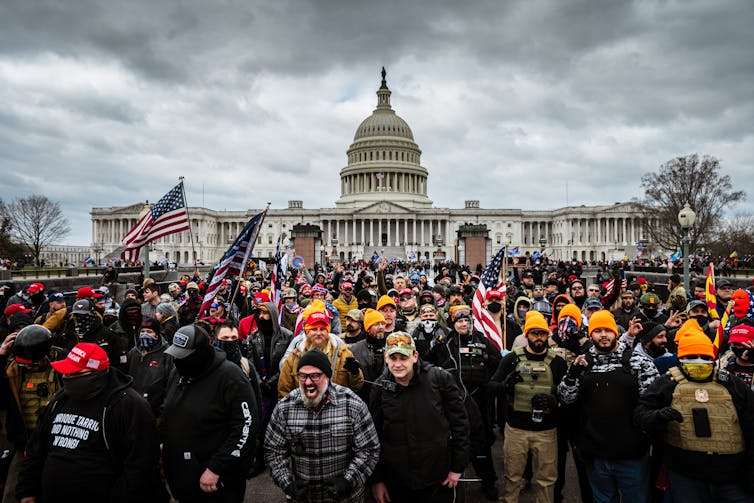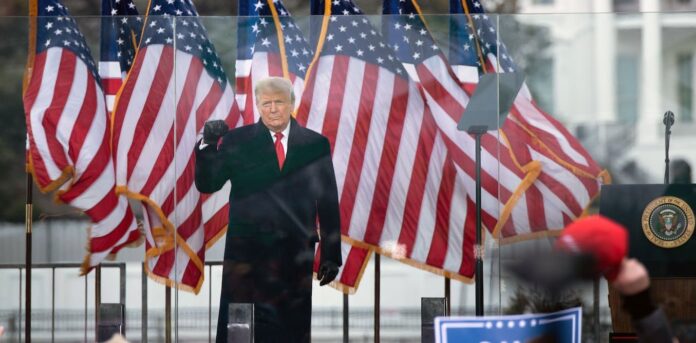More than 78 ‘friends’ of the Supreme Court offer advice on the 14th Amendment and Trump’s eligibility

By Wayne Unger, Quinnipiac University
Members of the U.S. Capitol Police targeted with “brutal violence” on Jan. 6, 2021, 25 historians of the U.S. Civil War and Reconstruction, the San Francisco Taxpayers Association and dozens of other parties have weighed in at the U.S. Supreme Court with their opinions about the case that has the potential to disqualify Donald Trump from the 2024 presidential election.
The justices will hear oral arguments in that case, Trump v. Anderson, on Feb. 8. 2024. The plaintiffs, a group of Colorado voters, claim that under Section 3 of the 14th Amendment to the U.S. Constitution, Trump is not constitutionally qualified to run for president because he “engaged in insurrection or rebellion” against the U.S. Constitution. When the Colorado Supreme Court ruled that Trump could not appear on that state’s ballot, Trump appealed the decision to the U.S. Supreme Court.
While the Supreme Court will ultimately determine Trump’s fate, the numerous parties who have chimed in aim to add context and additional arguments for the justices to consider.

78 amicus briefs
As with many cases before appellate courts, and especially those before the Supreme Court, outside interested parties can file what are called an amicus brief. The filers are referred to as “amicus curiae,” Latin for a “friend of the court.” They are not a party to the case but rather someone or a group who volunteer advice in a case before the court.
The purpose of amicus briefs varies. They can be used to share specialized knowledge with the courts. In their Trump v. Anderson amicus brief, constitutional law scholars Akhil Reed Amar of Yale Law School and Vikram David Amar of University of California, Davis, School of Law write about the history and significance of the first insurrection, which occurred in the 1860s. They describe this as an effort to “prevent the lawful inauguration of duly elected Abraham Lincoln.”
Others file amicus briefs to advance or further an argument. Some may discuss the potential effects of possible decisions. All share a common thread: Amicus briefs are filed to help the court shape the ruling in the case.
In Trump v. Anderson, the amicus filers who support Trump filed 34 briefs. Filers who support Anderson, the plaintiff whose name is on the case, filed 30 briefs. In addition, 14 briefs were filed in support of neither party.
The total of 78 amicus briefs filed is lower than other recent and controversial cases before the Supreme Court. For instance, in Dobbs v. Jackson Women’s Health Organization, the case that ultimately overturned the constitutional guarantee of a right to abortion, there were approximately 140 amicus briefs filed. In a recent affirmative action case, Students for Fair Admissions Inc. v. Harvard, which concluded that universities cannot use race as a consideration in admissions decisions, amici filed approximately 100 briefs.
While the total number of briefs filed in this case is notably lower, it is important to note that the Supreme Court expedited Trump v. Anderson, almost certainly because the presidential campaign is well underway. While normally there is a period of months to file amicus briefs in cases, the court’s expedited timeline directed amicus filers that they had less than four weeks to file their briefs.
Constitutional or unconstitutional?
In his amicus brief, U.S. Sen. Ted Cruz, a Republican from Texas and former presidential candidate himself, argues that the Colorado Supreme Court’s decision to remove Trump from its ballots was an unconstitutional encroachment on Congress’ powers
Former U.S. Appeals Judge J. Michael Luttig was part of a group of amicus filers made up of “former officials who worked in the last six Republican administrations, senior officials in the White House and Department of Justice, and others who support a strong, elected Presidency.” Their brief argues that the Supreme Court is well within its constitutional authority to determine the constitutional qualifications of the presidency, and that “Mr. Trump incited, and therefore engaged in, an armed insurrection against the Constitution’s express and foundational mandates that require the peaceful transfer of executive power to a newly elected President.”
Constitutional law scholars such as Berkeley’s Erwin Chemerinsky and Yale’s Bruce Ackerman argue in their filing that Trump’s rhetoric is not protected by the First Amendment. Thus, they write, the First Amendment should not affect how the court interprets and applies Section 3.
And the National Association for the Advancement of Colored People argues that the court should give consideration to the 14th Amendment’s commitment to equal protection and multiracial democracy because the drafters of the amendment had a “practical concern about how insurrectionists would respect the rights of those whom they did not believe were entitled to rights.”

Unexpected friends
Although legal scholars and politicians frequently file amicus briefs in cases, this case also generated significant interest from nontraditional amici.
An unspecified number of Capitol Police officers who fought against the rioters on Jan. 6, 2021, to protect senators and representatives argue that the First Amendment should not apply because Trump’s speech was “integral to unlawful activity”.
The San Francisco Taxpayers Association’s brief claims that Trump is disqualified because, in addition to engaging in an insurrection, Trump also engaged in a “rebellion against the Constitution, by knowingly disregarding the presidential oath of office.” This rebellion, as they note, is a separate basis for disqualification under Section 3 of the 14th Amendment.
And international scholars who study democracies, political violence and the rule of law write that Trump’s actions following the November 2020 election “are alarmingly similar to activities that have destroyed democracies in other countries.”
Even voters who say they “have a constitutional interest in a ballot” filed amicus briefs in this case. Voters in New Hampshire argue that all Americans have a constitutional right to “a ballot free of such an insurrectionist” as Trump.
‘Great peril’ for the nation
Most of the amicus briefs in this case, however, reiterate the litigants’ core arguments. Trump’s supporters argue that Section 3 does not apply to the office of the president. Even if it did, they assert, Trump’s speech should be protected by the First Amendment. Moreover, they argue that Section 3 requires an act of Congress to enable its enforcement.
Anderson’s supporters who seek Trump’s disqualification argue that Section 3 does apply to the president. They also argue that Trump engaged in an insurrection as evidenced by the violence on Jan. 6, 2021. Further, they argue that Section 3 automatically applies unless Congress acts by removing the disqualification disability.
And both sides argue that the Supreme Court must decide the issue now because any delay will “place the Nation in great peril”.
Whether the Supreme Court relies on any of the amicus briefs is up to the justices’ discretion. But without any doubt, this case is monumental – likely more consequential than Bush v. Gore, which decided the outcome of the 2000 presidential election in George W. Bush’s favor. While the court’s self-imposed deadline to release its decision is the end of June, it is reasonable to expect a decision in this case sooner rather than later.![]()
Wayne Unger, Assistant Professor of Law, Quinnipiac University
This article is republished from The Conversation under a Creative Commons license. Read the original article.



